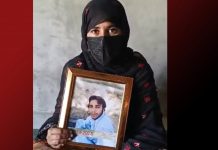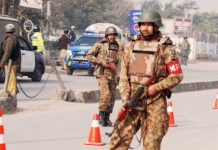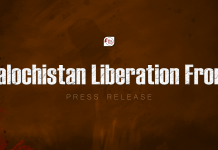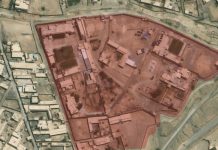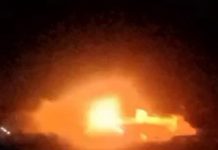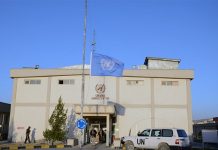Author: Helena Baloch
Will Balochistan rise to the occasion?
In the face of adversity, where voices are silenced and rights are trampled, this question challenges us to tap into our collective strength and resilience. It urges us to ask ourselves whether we will turn a blind eye to the suffering of the Baloch people or rise to the occasion and become advocates for justice. Does the “security” of one group have to come at the expense of another’s? Why are conversations on this topic so uncomfortable? This well-documented “conflict” is often labeled off-limits in professional, educational, and casual settings. It is censored from our newsfeeds and erased from public spaces, but it doesn’t have to be this way. The avoidance of this issue has become a troubling norm in media and public discourse. Have you ever confronted the harsh reality that the Baloch people have endured decades of systematic persecution? This raises a critical question: Will this atrocity ultimately consume us, or will we find the strength to rise up and put an end to it?
It is a tremendous struggle to find the right words to begin expressing this reality; it feels like an impossible task. Hearts are heavy, filled with tears, pain, and the sorrow of lost humanity. Each word is a drop of sorrow, a fragment of the pain expressed through tears as we confront the brutal reality of violence that shatters lives. It is a raw, aching truth that grips our souls, and I wonder: does anyone else feel this weight, this desperate longing for compassion in a world so often devoid of it? The state’s policies on genocide have been relentless, driven by a systematic agenda that enables the regular abduction of Baloch individuals. Despite the ongoing oppression, the people of Balochistan are standing strong, bravely fighting to seek justice for their loved ones who have disappeared without a trace. The Baloch identity has tragically become a focal point of conflict in the region, with individuals abducted solely because of their ethnicity. This is not just a statistic; it is a profound human tragedy that underscores the grave violations of human rights occurring daily. It is a heartbreaking reminder of the immense challenges the Baloch people face as they fight to assert their identity and claim their rights in a region that has long denied them both. The state remains locked in a troubling internal debate about whether to persist with its practice of abduction or to impose new colonial laws in Balochistan. The countless protests across Balochistan and Pakistan reflect a profound sense of despair, as these demonstrations take place without any protective oversight or support. The Baloch nation cries out in exhaustion, enduring the harsh realities of daily protests on broken roads, under the scorching sun of unbearable summers and the biting chill of extreme winters. How long must they continue year after year, decade after decade on the same streets of their stolen, sorrowful land? How can the puppets of the state defend the seeds of violence and despair they have sown, all while facing an unresponsive regime that perpetuates genocidal policies? The discovery of mass graves by Baloch shepherds serves as a devastating reminder of the violence that has long afflicted the region, revealing the profound sorrow and loss experienced by families. Each grave tells a story of lives brutally cut short, leaving behind grieving loved ones searching for answers. Amid this suffering, Baloch women have endured unimaginable pain, not only mourning the loss of their loved ones but also bearing the weight of a system that seeks to diminish them. The state may see these women as insignificant, but they are worth more than hundreds of those who oppress them.
The so called judiciary of Pakistan stands as a profound symbol of failure and disgrace. Regrettably, the judiciary, along with the legislative and executive branches, has consistently failed to fulfill its responsibilities to the oppressed Baloch nation. It is evident that the vision for Balochistan has been one of oppression, military operations, and the systematic looting of its resources. In a bid to enhance its economic standing, Pakistan has exploited Gwadar City in Balochistan to forge diplomatic ties with China, leaving the Baloch people drained and marginalized. Meanwhile, Punjab flourishes with access to gas, electricity, and other resources. Is it not disheartening to hear that the pleas of the Baloch people for basic necessities are perpetually ignored? The people have been forced to live without even the most fundamental resources, such as clean drinking water. When they dare to raise their voices in resistance, they face abduction, silencing their cries for justice. Even children seeking knowledge are not spared, as they too are subjected to abduction, often labeled as brainwashed operatives by those in power. The youth are similarly stigmatized, their clothing and appearance scrutinized under the lens of suspicion. Despite the pervasive violence, harassment, and abductions, the men and women of Balochistan continue to resist the state’s oppressive tactics. It is heartbreaking to consider that even elderly individuals, aged 70 or 80, have faced harassment. Various questions arise here: What if these were your children, your family, your friends, your loved ones? Is Zarina Marri still alive? How did Karima die, and where was her body discarded? How does the state maintain this illusion of justice? Why was Malik Naz murdered? What happened to Dr. Mahrang’s father? Why has Sammi’s father been abducted?
Take a moment to let that sink in. The mere thought is unbearable, isn’t it? Yet, this is the bleak reality faced by individuals in Balochistan every single day. The images we broadcast live, heart-wrenching scenes of devastation and despair, are not mere distant tragedies; they are the lived experiences of real people trapped in a relentless cycle of violence. The system that the state defends has little regard for the lives and well-being of the ordinary people; it is a system that prioritizes profit over humanity. Meanwhile, the fascist state is still talking miles and marathons about peace and humanity, a system rooted in shame that perpetuates inequality and suffering. How long will the world allow itself to be complicit in this cycle? How long will we ignore the urgent need for collective action and solidarity?
Deep down, we all know what is happening and why it is happening. We all understand the dynamics of power and privilege, yet we often choose inaction because it doesn’t directly affect us at least, not yet. But how long can we afford to remain indifferent? The truth is, it only takes a moment of courage to shed our cowardice and stand on the right side of history.
Another chilling question: Is the state motivated by the resources that have been extracted from the region for over seven decades? The state and its politicians continue to deny the reality of enforced disappearances, cloaking their actions in a misguided sense of nationalism. This fictional concept of nationalism of the state seems to have no end, leaving the Baloch people to bear the weight of their suffering in silence. The reports of missing persons are staggering; while the state claims that the number of enforced disappearances does not exceed one thousand, the reality is that it is likely more than ten thousand. State advocates assert that these individuals fled to Iran and Afghanistan to engage in terrorist activities. Is this not a disgraceful reflection of the state? It tortures its own citizens within their own cells using methods such as waterboarding and drilling. The state engages in a disturbing game of hide and seek, invading homes, harassing women, abusing children, and abducting young individuals who have traveled thousands of kilometers in pursuit of a better education, only to be seized by the state. Was there not a surge of violent animosity directed toward Balochistan in 1948? Or in the 1970s? What about the brutal aggression in Chaghi, followed by further atrocities in the Kharan desert? The ruthless rhetoric of Pervez Musharraf in 2005 was hardly surprising; as an advocate of violence, he threatened the Baloch people, warning them, “Don’t press us,” and “You won’t even know what has hit you,” flaunting the allure of brutality. However, the Baloch people, united as a nation, will not forgive the Pakistani state for its ongoing military operations in Balochistan, which have subjected them to decades of hardship. This state has consistently celebrated the deaths of Baloch individuals, leaving behind bodies adorned with cigarettes and the derogatory phrase “Pakistan Zindabad.”
Death Squads or Black Ops:
In the troubled province of Balochistan, a funded genocide force has been operating under the radar, leaving everything bloodshed, terror, and despair in its wake before our eyes. Perpetrated by an apartheid state, yet how often do we turn away, pretending we haven’t seen? How much longer can we lie to ourselves, convincing ourselves that we are powerless to act? For how long will everyone be blindfolded, clinging to feeble justifications of survival while ignoring the cries? Death squads, comprising concealed intelligence operatives and armed groups, have been targeting individuals and groups, including students and women, with impunity. These extrajudicial killings, enforced disappearances, fake encounters, torture, rape, arson, bombings, and mass graves have become an all too familiar reality in the region. A legacy of violence and intimidation; in a landscape dominated by fear, it is nearly impossible to find a corner untouched by the armed strongmen. Shafiq Mengal rules the Khuzdar region with an iron fist, Mufti Shahmir instills terror in Turbat, and Ali Haider Mohammad Hasni commands authority in Awaran. Across the province, similar gang leaders exert their influence, creating a web of intimidation that ensnares nearly every district. These ruthless squads have been known to demand ransom after abducting innocent individuals, and in some chilling instances, they have sought payment following the abduction of victims by the paramilitary Frontier Corps. The police, either rendered powerless by the strongmen’s connections or complicit in their operations for personal gain, stand by as silent witnesses to this reign of terror. The death squads thrive on a calculated strategy of fear, designed to silence dissent and crush any hope of resistance. This tactic has proven alarmingly effective; throughout the 2010s, mass protests in Balochistan were few and far between, with Quetta being one of the rare exceptions, despite the military’s unyielding oppression during this dark period. The people, though deeply fed up with the tyranny of the death squads, find themselves paralyzed by fear, reluctant to voice their grievances openly. The threat of violent retribution looms large, not just from the squads themselves but also from the powerful entities that pull their strings.
Pakistani Intelligence Agencies: The Masterminds Behind the Mayhem
The intelligence agencies have been accused of using these death squads to counter the resistance in Balochistan. In many areas of the province, these groups have been allowed to operate with impunity, engaging in activities like drug trafficking, looting, abduction, and killing without fear of consequence. In return for their services, they are rewarded with the freedom to organize celebratory car rallies on occasions such as August 14 and March 23. Similarly, nothing justifies kicking, punching, and beating people to the point of hospitalization and leaving them in a heap on the floor for hours, let alone the treatment of those living under occupation, apartheid, and colonialism. The same goes for Baloch women, who have not been spared from the wrath of these death squads. They are frequently harassed on social media with threatening texts and pictures, leaving them feeling vulnerable and exposed. Today, every area in Balochistan is plagued by these killing squads, with thousands of gang leaders and their puppets holding sway. The death squads have even targeted political leaders, as evident from the attempted assassination of Dr. Mahrang in Gwadar on July 28, 2024. The same squads were involved in a sit-in camp near the BYC protest in Islamabad in 2023-24. Despite the dismantling of some of these groups, the death squads continue to exist, holding certificates of killings. Within today’s increasingly polarized political landscape, anyone aspiring to engage in democratic politics whether as a mainstream politician or a student activist faces the daunting challenge of being targeted for their beliefs. The audacity to think or speak against the prevailing narrative can lead to silencing and backlash, creating an environment where fear stifles innovation and authentic dialogue.
Balochistan’s struggle against injustice and oppression is one of many struggles against oppressive powers. Decades of killings, enforced disappearances, and exploitations have caused deep scars, yet the people are unfazed and unmoved. Meanwhile, the silence on and deliberate ignorance of this issue add more to the adversities of the Baloch nation. Will Balochistan rise to the occasion? Its answer lies in the courage of the Baloch people and their will to speak out. True peace requires an end to the systemic persecution of the Baloch nation and the recognition of their rights. To remain silent is akin to being a part of it; therefore, history teaches us not to repeat past mistakes, yet the state seems deaf to this lesson. Its inaction in the face of violence and disregard for human life is a tragic indictment of its moral compass. We must stand on the right side of history, demanding accountability and an end to this senseless suffering.
Disclaimer: The views and opinions expressed in this article are those of the author and do not necessarily reflect the official policy or position of The Balochistan Post or any of its editors.












